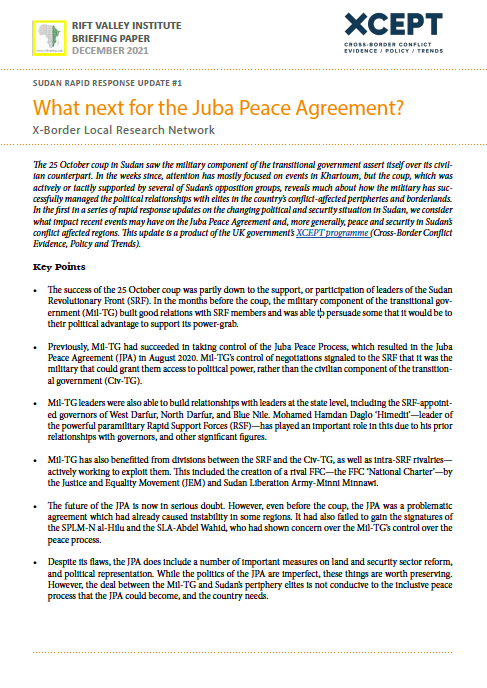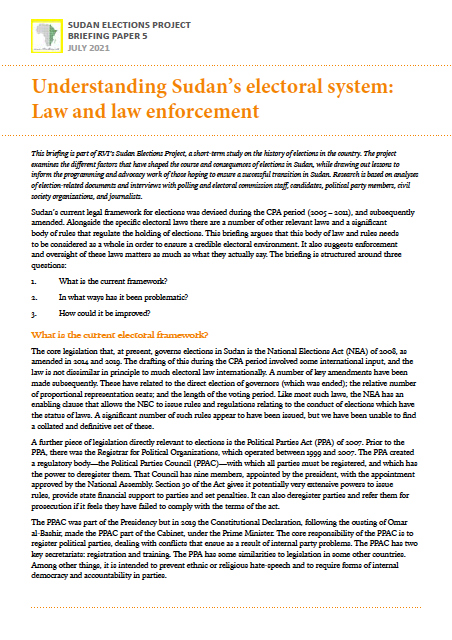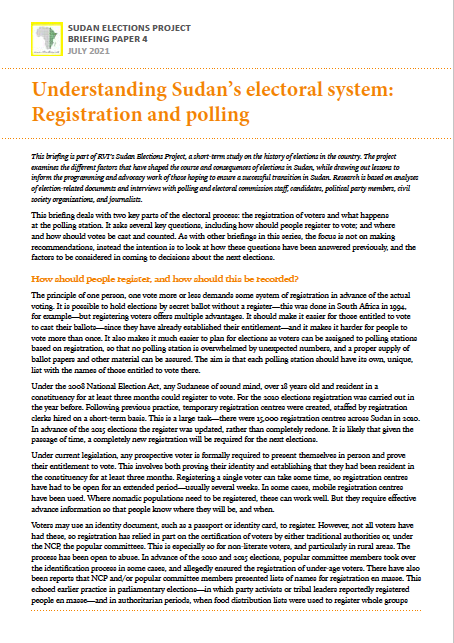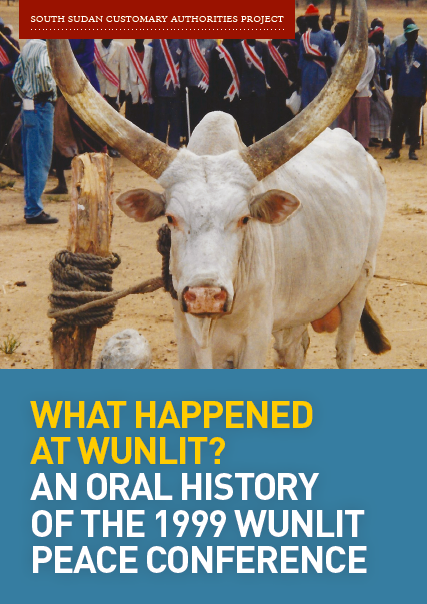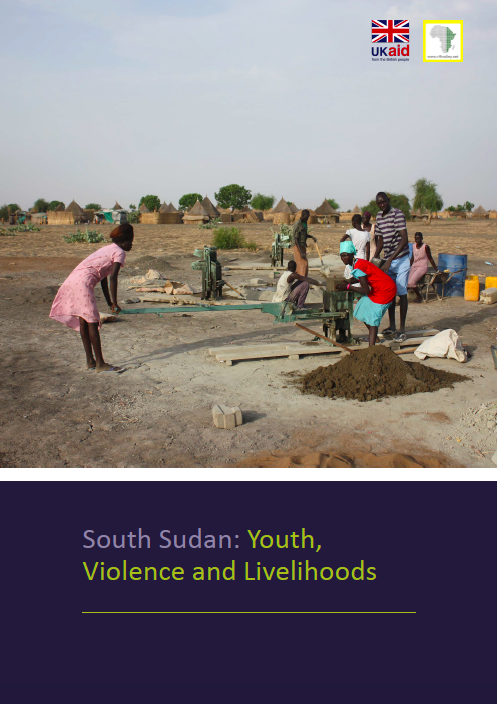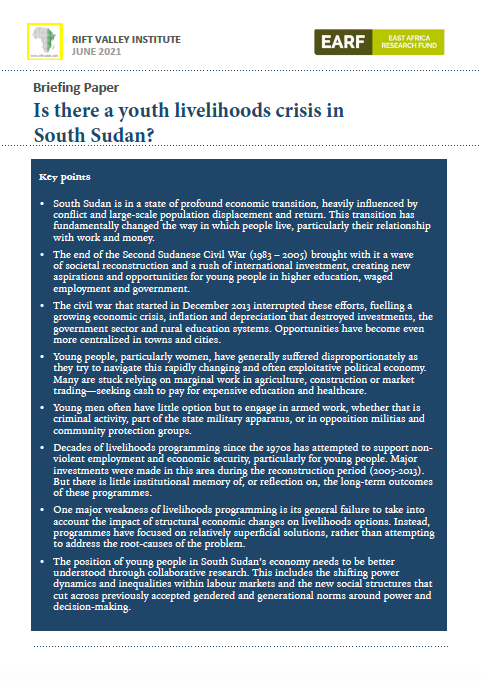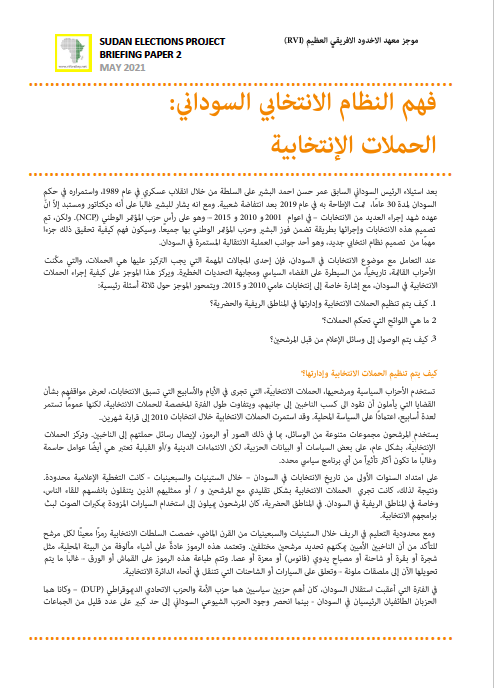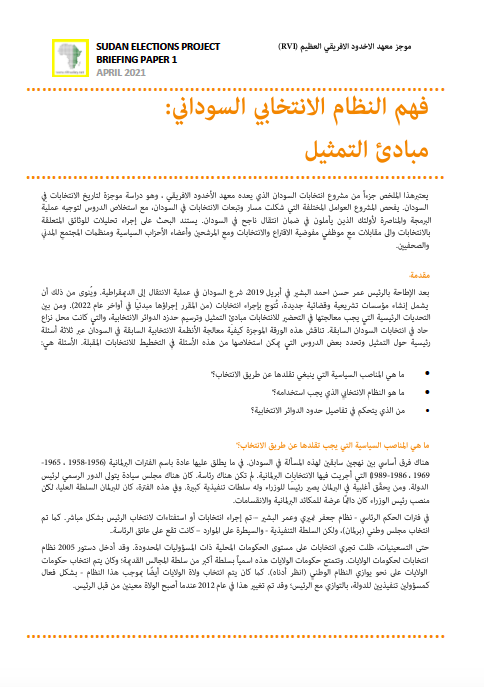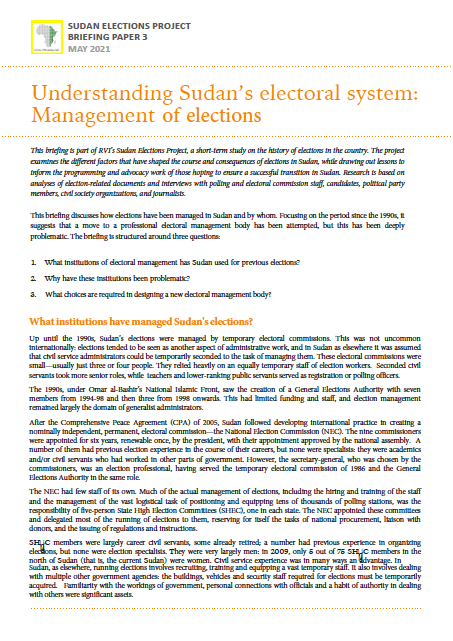The 25 October coup in Sudan saw the military component of the transitional government assert itself over its civilian counterpart. In the weeks since, attention has mostly focused on events in Khartoum, but the coup, which was actively or…
RVI publishes books, research reports, research papers, briefings and meeting reports in a range of formats. Publications cover policy, research, arts, culture and local knowledge in the countries of eastern and central Africa. Research publications—books, reports and papers—are peer-reviewed. Some RVI publications are also available in French and/or Arabic.
The RVI is a signatory of the Budapest Open Access Initiative (2001); all publications are free for download in PDF format under Creative Commons licences. The views expressed in books and reports published by the RVI are those of the authors, not the Institute.
SEARCH
PUBLICATION TYPE
LANGUAGE
REGION
COUNTRY

- By Raga Makawi, Justin Willis
- Download
In the first episode of the Sudan Elections podcast series ‘Voting for Change’, host Raga Makawi talks to Justin Willis- Professor of Modern History at Durham University – about election models adopted in Sudan’s modern history, key…
This briefing is part of RVI’s Sudan Elections Project, a short-term study on the history of elections in the country. The project examines the different factors that have shaped the course and consequences of elections in Sudan, while drawing…
This briefing is part of RVI’s Sudan Elections Project, a short-term study on the history of elections in the country. The project examines the different factors that have shaped the course and consequences of elections in Sudan, while drawing…
PRE-PRINT Wunlit was the most successful peace meeting in the history of the Sudans, a meeting where customary authorities took a leading role. It brought together representatives of Nuer and Dinka communities west of the Nile, communities that had…
This report explains the realities of life for South Sudan’s youth population, the majority of whom are living in conditions of extreme economic precarity. Young people face enormous challenges in trying to survive and progress in their lives. This…
South Sudan is in a state of profound economic transition, heavily influenced by conflict and large-scale population displacement and return. This transition has fundamentally changed the way in which people live, particularly their relationship with work and money. The…
بعد وصوله إلى السلطة من خلال انقلاب عسكري في عام ١٩٨٩، حكم الرئيس عمر البشير السودان لمدة ٣٠ عامًا حتى تمت الإطاحة به في عام ٢٠١٩ بعد انتفاضة شعبية. بينما يُشار إلى البشير غالبًا على أنه ديكتاتور ومستبد، فقد…
بعد الإطاحة بالرئيس عمر البشير في أبريل ٢٠١٩، بدأ السودان عملية الانتقال إلى الديمقراطية. يشمل ذلك إنشاء مؤسسات تشريعية وقضائية جديدة تتوج بإجراء انتخابات (مبدئيًا من المقرر إجراؤها في أواخر عام ٢٠٢٢). من بين التحديات الرئيسية التي يجب معالجتها…
This briefing is part of RVI’s Sudan Elections Project, a short-term study on the history of elections in the country. The project examines the different factors that have shaped the course and consequences of elections in Sudan, while drawing…
Recent Publications

Political Economy of Cash and Markets in Sudan
February 27, 2026
The research provides a snapshot of the war in Sudan in the period from February to April 2025. However, the war is dynamic, with political alliances and territorial control changing. The April 2023 conflict between the Sudan Armed Forces (SAF)

Rethinking Ethiopia II: Youth and politics
February 26, 2026
Seminar report Rethinking Ethiopia, a collaborative essay competition initiative between Addis Ababa University’s Institute for Peace and Security Studies (IPSS) and the Rift Valley Institute’s (RVI) Peace Research Facility (PRF), offers a platform for Ethiopian youth to express their ideas

2025 Year in Review
February 16, 2026
The 2025 Year in Review provides an overview of the Rift Valley Institute’s work over the past year across eastern and central Africa. The report highlights RVI’s research and publication outputs, education and training activities, and public forums and convenings,
